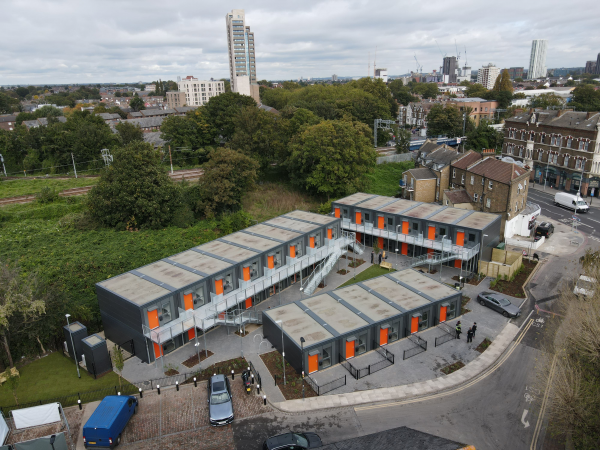









Image Credit : Haringey Council

Project Overview
Olive Morris Court (OMC) is an innovative 32 modular “SoloHaus” homes and support initiative by Haringey Council and The Hill Group designed to help residents who’ve experienced homelessness from returning to the streets. OMC is London’s first scheme completed through the Mayor’s Rough Sleeping Accommodation Programme. Since being opened in October 2021 by London’s Deputy Mayor for Housing, Tom Copley, OMC has helped 26 residents avoid returning to rough sleeping.
OMC is part of Haringey Council’s commitment to build over 3,000 new council homes by 2031 to help address the housing crisis. OMC’s construction utilised a fully modular, volumetric approach: its factory construction ensured consistent quality control and minimised disruption to the surrounding community. The Hill Group donated 16 of OMC’s 33 SoloHaus units. Co-designed by Hill with homeless charities, the SoloHaus provides residents with a safe and secure home, compliant with Secured by Design, that’s affordable to run. Its energy-efficient design cost a resident just £5 per week when it opened; even after recent price rises, weekly energy bills were just £6.90.
Haringey Council worked with Hill to transform a South Tottenham brownfield site (safeguarded by Transport for London for possible development of Crossrail 2) into a landscaped scheme of 32 new homes and support hub. OMC demonstrates how to combine innovations in materials and construction methods to deliver needs-led, sustainable homes integrated with the individually tailored support (for their physical, mental health, employment, and wellbeing needs) necessary to help residents avoid returning to rough sleeping.
Organisation
Team
• Haringey Council’s Street Homelessness and Supported Accommodation Teams – Gill Taylor, Ophelia Kingshott, Emily Snelling and Rae Clarke;
• The Hill Group – Greg Hill, Cain Peters, Jag Bains;
• Project Architect – David Williams (Ingleton Wood);
• Project QS – Mike Tuck (Currie and Brown);
• Haringey Council’s Major Works Team – Graham Sheret;
• Haringey Council’s Housing Delivery team – Peter Exton and Jack Goulde;
• Planning Consultancy – Sphere 25.
Project Brief
OMC isn’t simply buildings; it’s a purpose-built development designed to assist people who have experienced homelessness.
During the pandemic, Haringey provided emergency accommodation to anyone sleeping rough or at risk of sleeping rough. Through ‘Everybody In’, Haringey assisted 1,300 people affected by homelessness with housing, subsistence, employment, and health support. Haringey also established safe and secure move-on options to fulfil our commitment for people not to return to the streets.
The pandemic created additional urgency for delivering safe and secure move-on accommodation for residents at risk of rough sleeping. OMC was delivered at pace and used a fully modular, volumetric approach to meet tight timescales.
Factory construction meant higher-quality control for the new homes, and less disruption for neighbours during the installation of the new homes that was achieved in under five days. OMC’s 33 SoloHaus units take advantage of an innovative fabric-led design, significant insulation, and a state-of-the-art communal heating and hot water system, keeping residents’ bills low.
OMC is integrated with public health and care services, providing a hub to deliver wrap-around support for residents. OMC is part of Haringey’s commitment to meet the housing, health and wellbeing needs of Combined Homelessness and Information Network (CHAIN) verified people. OMC has already successfully provided secure homes and support to 26 residents with a history of rough sleeping, preventing their return to the streets.
Project Innovation/Need
Built with category 1 volumetric methods, it took just four days to deliver and install OMC’s 33 units. OMC avoided the usual problems of access (such as the constant stream of concrete lorries), greatly reducing disturbance to neighbours.
Each new home was fitted out in the factory rather than on site, and Hill worked with a church charity to provide new residents with two sets of new clothes and shoes.
The SoloHaus provides vulnerable residents with a safe and secure home, that’s cheap to run. An innovative fabric-led design, significant insulation, and a state-of-the-art communal heating and hot water system keep residents’ energy bills low. On opening, residents’ weekly energy bills were just £5; even after recent price rises, they’re still only £6.90.
Each SoloHaus is self-contained, furnished, with a fully equipped and stocked kitchenette and bathroom, and a washing machine – removing practical obstacles to residents returning to independent living.
Every home is designed for resident’s changing needs: corridors and rooms are wheelchair accessible; each home complies with building regulations part M4(2) with level access and surfaces always within reach for residents to steady themselves.
The SoloHaus complies with Secured by Design: residents move in confident they can control access to their homes. A Haringey staff member recalls: “One new resident expressed her gratitude through tears of joy. Why? Because for everyone at OMC, it’s the first time in 10 years they’ve had their own front door and a home to call their own.”
Design Challenge
OMC was delivered at pace as part of Haringey’s response to the pandemic and the ‘Everybody In’ initiative. A fully modular, volumetric approach was adopted to meet the tight timescales involved in delivering a safe and secure move-on accommodation for residents at risk of rough sleeping. However, OMC has also demonstrated the cost-effectiveness of modular homes, both for the Council (in construction costs) and for residents (in their very low energy bills).
Built on formerly derelict land that attracted fly-tipping and anti-social behaviour, OMC is situated in a predominately urban residential area, although with shops, cafes, and small businesses along the High Road (A10) and close to South Tottenham Overground Station.
Gone is the derelict brownfield site: OMC is a landscaped scheme of 32 smart new homes and a support hub surrounded by 271m2 of new grass, four new trees, and low-level planting. The energy efficient homes mean total CO2 emissions savings 31% beyond 2020’s planning requirements.
OMC advances Haringey’s commitment to tackling climate change. By utilising a fully modular, volumetric approach, OMC reduced the energy needed to transport construction materials to the site. Installation was under five days, with the foundations, services, and landscaping constituting most of the time on site.
OMC is changing lives: as Resident B says, “it’s my home. I’m comfortable here… because of how the staff are with me and the things they’ve done to help me. My journey is not over, I’ve got lots still to do before I leave.”
Future Impact
Winning this year’s “Better Future – Equity & Inclusion” award would recognise everyone involved in OMC’s innovative use of SoloHaus and in delivering its wrap-around support. More importantly, winning would help us share our learning, of how to better support homeless residents.
OMC demonstrates the power of partnership – of housing, social care, and public health – to provide the homes and life-changing support for some of Haringey’s most vulnerable residents. OMC also makes more inclusive Haringey’s commitment to build 3,000 new council homes by 2031 to help address the housing crisis, showing how to combine innovative construction methods with the support necessary to help vulnerable residents.
Developed rapidly as part of Haringey’s pandemic response, it informs our other homelessness transition projects, such as167 The Roundway, which now has planning consent for five modular homes.
OMC has delivered 32 new SoloHaus homes for people who often haven’t had a home for years. By integrating heath and support, OMC helps residents tackle the issues contributing to their homelessness. Haringey’s Homeless Health Inclusion Team (HHIT), a jointly commissioned specialist team for people who’ve experienced homelessness, delivers practical support and advice to residents. OMC operates an 'in-reach' delivery model providing support to residents in their homes by onsite and visiting practitioners. To date, 70% of residents are accessing substance use support, 53% have accessed mental health support and 100% are registered with a GP, and targeted health interventions successfully delivered onsite (including the Vaccine Bus and the Find & Treat).
Better Future - Equity & Inclusion
Projects that expand and grow the inclusion, integration, diversity and community.
More Details

